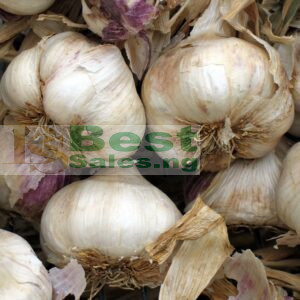The price of garlic per kg in Nigeria today can vary based on location and seasonal changes. The international price of garlic is given per ton. Garlic can be found predominantly in the northern part of Nigeria.
Uses and Importance of Garlic in Nigeria
Garlic is a highly valued ingredient in Nigerian cuisine. It is used in a variety of dishes, including soups, stews, and sauces, to enhance flavor and aroma. The pungent taste of garlic adds a unique depth to many traditional Nigerian recipes.
Beyond culinary uses, garlic is also recognized for its medicinal properties. It is rich in antioxidants and has been used for centuries in Nigeria to boost the immune system and fight off colds and flu. It is also believed to lower blood pressure and cholesterol levels, promoting heart health.
In agriculture, garlic is used as a natural pesticide. Nigerian farmers plant garlic around their crops to deter pests, reducing the need for chemical pesticides. This not only protects the environment but also ensures the safety and health of consumers.
Garlic is also used in Nigeria for its spiritual significance. In some cultures, it is believed to ward off evil spirits and bring good luck. It is often used in traditional ceremonies and rituals.
Finally, the cultivation of garlic provides economic benefits for Nigeria. It offers a source of income for many farmers and contributes to the country’s agricultural sector. The demand for garlic, both locally and internationally, presents opportunities for export and economic growth.
The Garlic Export Market in Nigeria
Ginger export market in Nigeria has witnessed remarkable growth over the years due to the increasing global demand for the spice. Nigeria, being one of the largest producers of garlic in Africa, has capitalized on this demand, exporting the crop to various parts of the world.
Nigeria’s garlic export market is driven by several factors. Firstly, the country’s favorable climate and fertile soil conditions make it an ideal location for garlic cultivation. This allows for the production of high-quality garlic that meets international standards.
Secondly, the Nigerian government has implemented policies to encourage agricultural exports, including garlic. These policies include providing farmers with improved seedlings, training on modern farming techniques, and access to credit facilities. This has helped to increase the quantity and quality of garlic produced for export.
Despite these positive developments, the garlic export market in Nigeria faces several challenges. These include inadequate storage facilities, poor transportation infrastructure, and inconsistent power supply, which can affect the quality of the garlic being exported.
Furthermore, Nigerian garlic farmers and exporters also face competition from other major garlic-producing countries like China, which dominates the global garlic market. To remain competitive, Nigerian garlic exporters need to ensure they maintain high quality standards and invest in better storage and transportation facilities.
Overall, the future of the garlic export market in Nigeria looks promising. With the right investments and policies, Nigeria has the potential to become a major player in the global garlic market.
ALSO READ; Latest Price of Ginger per ton in Nigeria
The Role of Garlic in Nigerian Cuisine and Beyond
Garlic plays a significant role in Nigerian cuisine, contributing to the unique flavor profiles of many traditional dishes. It’s a common ingredient in soups, stews, and sauces, where it’s often combined with other spices and herbs to create rich, aromatic bases.
Beyond its culinary use, garlic is also valued for its medicinal properties. In traditional Nigerian medicine, it’s used as a remedy for various health issues, including respiratory problems, high blood pressure, and digestive disorders. Its antimicrobial properties make it a popular choice for treating infections.
Garlic also plays a role in Nigeria’s economy. It’s cultivated in several regions of the country, contributing to local economies and providing income for farmers. The demand for garlic, both locally and internationally, has made it a valuable agricultural commodity.
Despite its importance, the cultivation of garlic in Nigeria faces several challenges. These include pests and diseases, lack of access to quality seeds, and inadequate storage facilities. Addressing these issues could help increase production and meet the growing demand for this versatile crop.
Finally, garlic is also a part of Nigerian culture and traditions. It’s often used in rituals and ceremonies, and is believed to have protective properties. In some communities, it’s considered a symbol of good health and longevity.
Price of Garlic per kg in Nigeria
Garlic is a staple ingredient in many Nigerian dishes, and its price is based on seasonality, market demand, and transportation costs. As of the current market situation today July 2, 2024, the price of garlic per kilogram in Nigeria is 2,000 Nigerian Naira. While the price of garlic per ton is 2,000,000 Nigerian Naira.
